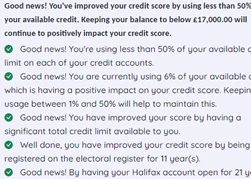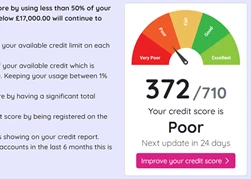The Link Between Credit Score and Car Insurance Rates

18th Oct 2025
When people think about what determines the cost of car insurance, most focus on driving history, age, postcode, or vehicle type. However, another important factor affects how much you pay - your credit score. Understanding the link between credit score and car insurance rates can help you make smarter financial decisions and save significantly on your premiums.
Your credit profile doesn’t just influence your ability to borrow; it also shapes how insurers perceive your overall responsibility. A strong score can signal reliability, while a weak one may raise concerns about potential risk. By learning how insurers use this information - and taking advantage of tools like credit check online and free credit score checker - you can take back control of your insurance costs.
Why Insurers Care About Credit Scores?
Car insurers are essentially in the business of assessing risk. They use a range of data to predict how likely a driver is to make a claim. Traditionally, this included accident history, vehicle model, location, and claim patterns. However, decades of industry research have uncovered a correlation between credit behaviour and insurance claims.
People with higher credit scores tend to make fewer claims and manage their finances responsibly. In contrast, those with lower scores are statistically more likely to file larger or more frequent claims. This evidence led insurers to incorporate credit-based metrics when setting premiums.
Whether it seems fair or not, the link between credit score and car insurance rates is based on data-driven outcomes. Drivers with good credit are considered less risky, and therefore, they often enjoy lower insurance premiums.
If you’re unsure where you stand, using a credit check online tool can give you an instant overview of your financial profile - helping you understand how insurers might view you.
How Credit Data Impacts Your Premium
Insurers don’t access your entire credit report. Instead, they generate a specific insurance score, derived from selected elements of your credit history. This score works similarly to a credit rating but is customised for insurance purposes.
Typical factors that influence this score include:
· Payment history: Whether you pay bills on time
· Credit utilisation: How much of your available credit you use
· Length of credit history: The longer, the better
· Types of credit: A mix of loans, cards, or mortgages
· Recent inquiries: Too many new applications can signal financial strain
This insurance score is combined with driving data - such as accident records and claim frequency - to determine your premium. It means that two drivers with identical cars and records can receive vastly different quotes simply because one maintains better credit.
To avoid surprises, it’s wise to regularly check credit online or use a free credit score checker. These tools, such as those provided by CreditCheckOnline.co.uk, make it easier to track changes and correct errors before they affect your premiums.
Advantages and Disadvantages of Credit-Based Pricing
1: Advantages for Insurers
· More accurate: Credit scores allow insurers to price policies more fairly, rewarding responsible financial behaviour.
· Lower premiums for good credit: Drivers with high scores often benefit from cheaper rates, reflecting their lower risk profile.
2: Disadvantages for Consumers
· Penalties for financial hardship: Even safe drivers can be penalised if they experience financial struggles or temporary credit issues.
· Lack of transparency: Many consumers don’t realise that their credit affects insurance until they face unexpectedly high quotes.
· Cycle of difficulty: High insurance costs can add pressure on finances, making it harder to recover credit scores.
Despite the controversy, using credit as part of insurance pricing remains common in the UK and abroad. For now, the link between credit score and car insurance rates is an established practice - meaning your financial habits can influence how much you pay to stay on the road.
How Much Difference Can It Make?
The gap between good and bad credit can be substantial. Studies show that poor credit can increase annual insurance costs by 20% to 50% compared to very good credit ratings. While insurers won’t disclose exact algorithms, the pattern is clear: improving your credit can directly lower your car insurance costs.
This is why consistent monitoring through credit check online platforms is essential. These services let you see where you stand, highlight issues that may hurt your score, and guide you toward improvements.
How to Improve Your Credit and Lower Your Premium?
The best news is that your credit score isn’t fixed - it can be improved with effort and consistency. Even small positive changes can influence the link between credit score and car insurance rates. Here’s how:
1. Pay all bills on time: Late payments are one of the biggest negative factors.
2. Reduce credit card balances: Aim to use less than 30% of your available credit.
3. Avoid multiple new applications: Frequent credit checks can lower your score temporarily.
4. Keep old accounts open: A long credit history builds stability.
5. Monitor your score regularly: Use a free credit score checker to track progress.
If you spot any errors on your credit report, dispute them immediately with the relevant credit reference agency. A simple correction can lead to better insurance pricing in the future.
By maintaining good credit habits, you not only improve financial health but also gain practical benefits - from cheaper loans to reduced car insurance premiums.
Tools That Make a Difference
In today’s digital age, it’s easier than ever to monitor and improve your financial health. Platforms like CreditCheckOnline.co.uk let you perform a credit check online in minutes. These services give you real-time insights into what’s helping or hurting your score.
Similarly, a free credit score checker provides an instant snapshot of your credit standing. While it may not match the exact insurance score used by providers, it offers an accurate benchmark to guide improvements.
By using both tools consistently, you can better understand your credit profile, identify trends, and take control of the factors that affect your car insurance premiums.
Is It Fair to Use Credit in Insurance Pricing?
Many consumers argue that credit-based insurance scoring is unfair, claiming that driving ability - not financial history - should determine rates. Factors like job loss, illness, or divorce can negatively affect credit through no fault of the individual, yet still raise premiums.
Insurers, on the other hand, maintain that credit data is a proven indicator of risk. They argue that eliminating it would force higher premiums for everyone, as low-risk drivers would effectively subsidise those with riskier profiles.
Until regulation changes, understanding this link between credit score and car insurance rates is vital for anyone hoping to manage their financial and insurance outcomes effectively.
The Future of Credit and Car Insurance
With technological advancements, the reliance on credit data may eventually decrease. Telematics and “black box” insurance, for example, allow insurers to base rates on real driving behaviour - such as braking, speed, and mileage - instead of financial data.
However, credit information remains deeply integrated into most underwriting models. For the foreseeable future, maintaining a strong score remains one of the most effective ways to manage insurance costs.
That’s why regularly using a credit check online service or free credit score checker is essential. It empowers you to identify weaknesses early and take action before they impact your premiums.
Final Thoughts
The link between credit score and car insurance rates plays a bigger role in your financial life than most realise. Your credit behaviour doesn’t just affect your borrowing power - it influences how much you pay for everyday essentials like car insurance.
By using trusted tools like CreditCheckOnline.co.uk, you can perform a credit check online, monitor your progress through a free credit score checker, and take practical steps to strengthen your profile.
In the long run, maintaining good credit isn’t just about improving numbers - it’s about gaining real financial freedom, stability, and the satisfaction of knowing you’re paying only what’s fair for your insurance.
Don't risk missing
something important
Access a comprehensive credit report
that includes detailed data from TransUnion
View your credit score for only £1.95.
You can view it for 1 month, after which it will be £14.95 per month unless cancelled.
See How You Score

See How You Score
An Independent View Of Your Credit Score
Lenders typically use their own systems to calculate your Credit Score based on the information in your Credit Report, often checking with one or more Credit Reference Agencies. Your Credit Check Online Credit Score is derived from all the Credit Report information we gather from TransUnion, helping you understand how you might be assessed when applying for credit.

Understand What is Affecting Your Credit Score
Quickly see how the details in your Credit Report influence your Credit Check Online Credit Score, both positively and negatively. This clear overview helps you identify areas for improvement and better understand the factors that lenders consider when assessing your creditworthiness.
View your credit score for only £1.95.
You can view it for 1 month, after which it will be £14.95 per month unless cancelled.